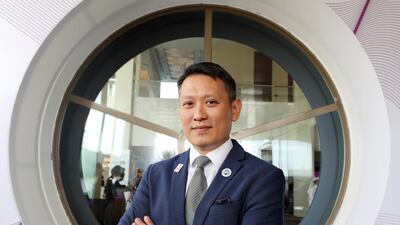Tighter international regulations is needed for cryptocurrency trading to mitigate financial crime, said the head of the Financial Services Regulatory Authority of the Abu Dhabi Global Market.
“This space needs to be properly regulated, otherwise there is the risk of financial crime," said Richard Teng, chief executive of the FSRA. “Every time a coin gets stolen or lost, it affects the confidence in this asset class.”
ADGM last year published a guidance on virtual currencies and initial coin offerings – the digital currency version of public share listings – following widespread criticism of the industry and extreme volatility in the trading prices of popular cryptocurrencies such as Bitcoin. ADGM was the first GCC financial centre to issue guidance on virtual money. The document clarifies how and for whom ICOs can be used to raise funds and states that the virtual "tokens" offered for sale in ICOs should be treated as "special investments" under ADGM’s regulatory framework. Virtual currencies, on the other hand, should be treated as commodities, it adds.
“We are confident that our comprehensive regime - which we have shared with global regulators like the SEC [US Securities and Exchange Commission], the UK Treasury, Financial Conduct Authority and Bank of England, and regulators in Singapore, Hong Kong and Japan - can address these risks and bring greater confidence into this asset class,” Mr Teng said in an interview during the Fintech Abu Dhabi event this week.
While the rapid rise of cryptocurrencies has captured the world’s attention, many analysts and regulators have warned investors to be careful, claiming it is a bubble waiting to burst and citing lack of global regulation.
Jim Yong Kim, the head of the World Bank, compared cryptocurrencies to illegitimate "Ponzi schemes" in February.
Last week, the MVIS CryptoCompare Digital Assets 10 Index extended its collapse from a January high to 80 per cent. The fall exceeded the Nasdaq Composite Index’s 78 per cent peak-to-trough decline after the dot-com bubble burst in 2000.
Many regulators around the world have issued warnings to investors after instances of fraud and misleading offers in the ICO market. In 2017, around $6 billion was raised in ICOs, according to Cointelegraph, a cryptocurrency news website.
___________
Read more:
UAE issues warning against initial coin offerings as cryptocurrencies plunge
Abu Dhabi courts fintech firms and investors to grow digital economy
Bitcoin skids amid broad cryptocurrency sell-off
____________
Regulators, including the Central Bank of the UAE, are beginning to regulate digital money as the market grows. Despite issuing warnings last October and in February, the UAE regulator, Securities and Commodities Authority, this month approved a plan to regulate ICOs and recognise them as securities, according to a statement from SCA chairman and Minister of Economy Sultan Al Mansouri.
The announcement came after the SCA undertook a study on best international practices. Mr Teng said “a lot has changed” in the past few months in terms of attitudes towards cryptocurrencies, and that people have moved from a fear and concern over the industry to a recognition that it is growing and rules must be developed accordingly.
Yet it is “inappropriate” that many jurisdictions across the world still continue to regulate crypto asset exchanges in the same way as traditional money services, he added. ADGM’s guidance is intended to address risks not only for retail and sophisticated investors in the cryptocurrency space, but also institutional investors.
“Once you bring them into the market, you will see the prices become much less volatile, but institutions only come in if you help them address the risks,” he said.

